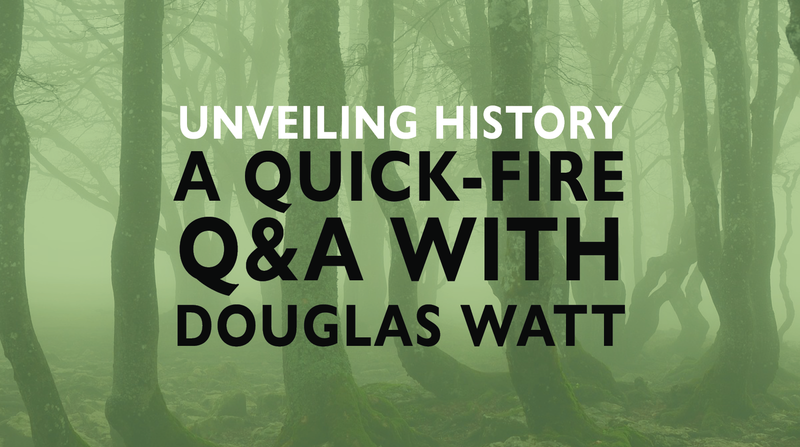Unveiling History
A Quick-fire Q&A with Douglas Watt

A Quick-fire Q&A with Douglas Watt
Join us as Douglas Watt, author of A Case of Desecration in the West, takes part in our series of quick-fire Q&As!
What is a quick-fire Q&A?
We have our interviewee pick a number at random and we ask them the general question listed next to it.
Shortly after we switch to asking book-specific questions, to give you a brief insight into our wonderful writers and their books.
What is your favourite writing snack slash drink?
Coffee.
What is your favourite breakfast?
Probably bacon and eggs.
What are you currently reading?
I'm currently reading a book by, John Burnside called The Music of Time. A series of essays about 20th-century poets, which is very, very interesting.
If you had to choose who's your favourite author?
That’s a hard question. 'I do like Georges Simenon. I think Inspector Maigret is a great character. I like Simenon's short,clipped descriptive style
What advice would you give to aspiring authors?
Just to keep going despite rejections. I would say to work on an area of expertise, like 17th-century history. It gives you a particular field you can play in. I think it's quite important to differentiate yourself from someone else.
What is the most difficult thing about being an author?
I would say coping with long periods of silence, when nothing much happens, when you're just kind of on your own writing a book which, you know, you might write ten words one day and a thousand the next, but the book might never materialise for years
If you could win an Olympic medal for any sport, real or not, what would it be? Real or not?
Maybe it'd be the 100m breaststroke. David Wilkie went to my school, and he came to give us a talk when he won the gold medal. It must be pretty exciting to win a swimming gold medal.
Why did you choose the title that you did?
I think the titles of the books in the series came about as I was writing the book.
I wanted to set a book in the west of Scotland. So that had to become part of the title, but the actual desecration came as I was researching the Quakers, south of Glasgow in the late 17th century. I was quite surprised to find were numerous, but they were also being persecuted by the Covenanters who'd been who had been persecuted themselves, before the Glorious Revolution. One of the things I found out was that a Quaker burial ground had been desecrated in the area by Covenanters. Then, obviously Mackenzie was involved in this case, so a case of desecration could have developed in the West because it's set in Glasgow and Hamilton.
If you could meet your characters, what would you say to them?
I would say to Davie to lighten up.
I’d be a bit scared of meeting John. It could be a bit daunting.
I'd like to meet them both for a game of golf. They're both keen golfers. Playing with them on one of the 17th-century golf courses and having a chat about all the political and religious issues of the day.
How did the narrative for this book come about?
I know the characters very well because this is the sixth in the series. So, it was another case for McKenzie. Most of the books have been in and around Edinburgh before, so it was time to journey towards Glasgow. It wrote itself to some degree once I had done the research.
Why did you choose the cover that you did?
I like the gothic tones on the cover. There's a hidden society within the book. We echoed that with the castle ruins and the shadowy figure.
How long was this book in the works for?
Probably about 3 or 4 years ago. I started writing it during Covid after the last book was published. Then I didn't look at it for over a year because we moved house, and I changed jobs. I went back to it in late 2020 to finish it off. I think books sometimes benefit from being left for maybe a year, or a couple of years. Then you go back to them with fresh eyes.
Would you and your main character get along?
Yeah, I think I think so mean. The main character is quite selfish. He's self-assured, successful lawyer who has great faith in his own abilities. So, he's a bit arrogant in that respect. But his life has been impacted by tragedy – the death of his wife. So, he's afflicted by melancholy. I would have sympathy with him.
What was the most emotional part about writing this book?
It's a dark story. There's quite a lot of emotion in it.
Scougall’s narrative was quite difficult. His wife was, pregnant during the case. Obviously, childbirth was a risky business in the 17th century.
The other emotional narrative was with the story of the black servant. I don't want to give too much away, but it was quite emotional researching the history of slavery, the connections with Glasgow and the impact that it had on individuals' lives.

If you’re intrigued by his blend of historical accuracy, gripping narratives and complex characters, don’t miss the opportunity to meet Douglas in person. He will be launching A Case of Desecration in the West in Edinburgh on October 18th.
We hope to see you there for what promises to be an engaging and memorable evening!